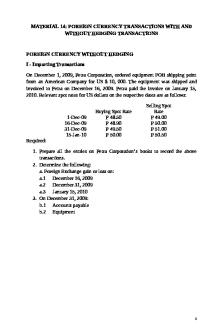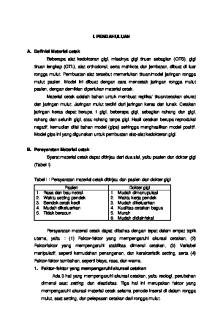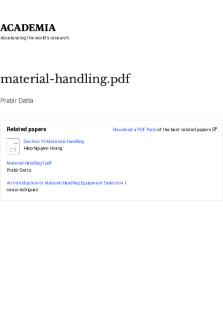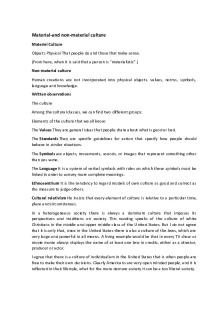English Notes-practice material PDF

| Title | English Notes-practice material |
|---|---|
| Author | T2-11-santhosh Kumar |
| Course | Litrature |
| Institution | Anna University |
| Pages | 61 |
| File Size | 2 MB |
| File Type | |
| Total Downloads | 97 |
| Total Views | 149 |
Summary
Its a semester one english practice materials...
Description
K.L.N. COLLEGE OF ENGINEERING DEPARTMENT OF ENGLISH Study Materials Part – A I. PRONOUN A Pronoun is a word which is used instead of a noun. A Pronoun is used instead of a noun to avoid repetition of a noun There are several different kinds of pronouns, they are
Personal pronouns (e.g., he, they) Demonstrative pronouns (e.g., this, these) Interrogative pronouns (e.g., which, who) Possessive pronouns (e.g., his, your) Relative pronouns (e.g., which, where) Reflexive pronouns (e.g., itself, himself)
Personal Pronouns: The personal pronouns are I, you, he, she, it, we, they, and who. More often than not (but not exclusively), they replace nouns representing people. When most people think of pronouns, it is the personal pronouns that usually spring to mind. Example: We can't all be heroes because somebody has to sit on the curb and clap as they go by. I bought some batteries, but they weren't included. Demonstrative Pronouns: These pronouns are used to demonstrate (or indicate). This, that, these and those are all demonstrative pronouns. Examples:
This is the one I left in the car. Shall I take those?
Interrogative Pronouns: These pronouns are used in questions. Although they are classified as pronouns, it is not easy to see how they replace nouns. Who, which, what, where and how are all interrogative pronouns. Example:
Who told you to do that? Which dog won the race?
Possessive Pronouns: My, your, his, her, its, our, mine, ours, yours, his, hers, its, theirs are all possessive pronouns.
Have you seen her book?
Relative Pronouns: Relative pronouns are used to add more information to a sentence. Which, that, who (including whom and whose) and where are all relative pronouns. Examples:
Dr Adam Sissons, who lectured at Cambridge for more than 12 years, should have known the difference. The man who first saw the comet reported it as a UFO.
Reflexive Pronouns: A reflexive pronoun ends ...self or ...selves and refers to another noun or pronoun in the sentence (usually the subject of the sentence). The reflexive pronouns are myself, yourself, herself, himself, itself, ourselves, yourselves and themselves. Examples:
The dog bit itself. Are you talking to yourself?
Examples: 1. John and Peter are brothers. I know ………………………. very well and my father likes ………………….. very much. 2. This book has many interesting pictures and stories. I like ………………………… very much. 3. The woman gave sweets to the children, but ……………………………. did not thank …………………… 4. The teacher said, ‘John, you’re a naughty boy. ……………………. don’t obey …………………………’ 5. The boys were late so the teacher scolded ………………………….. 6. We have a good teacher. ………………………… advised ……………………….. to work harder. 7. My father told my mother, ‘I want ……………………….. to take these jewels and put …………………….. in a box. When …………………………. have done that come and see ………………………… and ……………………….. will tell ………………………………….. why ………………………. don’t want ………………………….. to keep …………………….. in that box.
Answers 1. John and Peter are brothers. I know them very well and my father likes them very much. 2. This book has many interesting pictures and stories. I like it very much. 3. The woman gave sweets to the children, but they did not thank her. 4. The teacher said, ‘John, you’re a naughty boy. You don’t obey me.’ 5. The boys were late so the teacher scolded them. 6. We have a good teacher. He / she advised us to work harder. 7. My father told my mother, ‘I want you to take these jewels and put them in a box. When you have done that come and see me and I will tell you why I don’t want you to keep them in that box. 2. GERUND AND INFINITIES:
Gerund: The term gerund is used to label an important use of the form of the verb ending in ing (for details of its formation and spelling, see English verbs). Other important uses are termed participle (used adjectivally or adverbially), and as a pure verbal noun. An -ing form is termed gerund when it behaves as a verb within a clause (so that it may be modified by an adverb or have an object); but the resulting clause as a whole (sometimes consisting of only one word, the gerund itself) functions as a noun within the larger sentence. For example, consider the sentence "Eating this cake is easy." Here, the gerund is the verb eating, which takes an object this cake. The entire clause eating this cake is then used as a noun, which in this case serves as the subject of the larger sentence.
Present or Continuous Perfect
Active
Passive
Loving
Being loved
Having loved
Having been loved
The same forms are available when the term participle is used. Examples of use The following sentences illustrate some uses of gerund clauses, showing how such a clause serves as a noun within the larger sentence. In some cases, the clause consists of just the gerund (although in many such cases the word could equally be analyzed as a pure verbal noun).
Swimming is fun. (gerund as subject of the sentence) I like swimming. (gerund as direct object) I never gave swimming all that much effort. (gerund as indirect object) Eating biscuits in front of the television is one way to relax. (gerund phrase as subject)
Do you fancy going out? (gerund phrase as direct object) On being elected president, he moved with his family to the capital. (gerund phrase as complement of a preposition)
Using gerunds of the appropriate auxiliary verbs, one can form gerund clauses that express perfect aspect and passive voice:
Being deceived can make someone feel angry. (passive) Having read the book once before makes me more prepared. (perfect) Role
Example
A Subject
Eating cakes is pleasant.
B Extra posed subject
It can be pleasant eating cakes.
C Subject Complement
What I'm looking forward to is eating cakes
D Direct object
I can't stop eating cakes.
E Prepositional object
I dreamt of eating cakes.
F Adverbial
He walks the streets eating cakes.
G Part of noun phrase
It's a picture of man eating cakes.
H Part of adjective phrase
They are all busy eating cakes.
I Complement of preposition
She takes pleasure in eating cakes.
He is ashamed of having been gambling all night. (perfect progressive aspect)
For more detail on when it is appropriate to use a gerund, see Verb patterns classified as gerund use below, and also §§ Uses of English verb forms and Gerund. INFINITIES: An infinitive is a verb form that acts as other parts of speech in a sentence. It is formed with to + base form of the verb. Ex: to buy, to work. Infinitive Examples Infinitives can be used as: an object following the verb: 1. Jim always forgets to eat a subject at the beginning of a sentence: 1. To travel around the world requires a lot of time and money. an adverb modifying a verb: 1. You promised to buy me a diamond ring.
an adjective modifying a noun: 1. Tara has the ability to succeed. Some verbs are directly followed by an infinitive: 1. Do you want to call your family now? Some verbs are directly followed by a noun or pronoun and then by an infinitive: 1. I convinced Catherine to become vegetarian. 2. He advised me to sell all my shares of stock. Some verbs can be followed by an infinitive or a gerund without causing a change in meaning: 1. Will you continue working after you give birth? 2. Will you continue to work after you give birth? Some verbs can be followed by an infinitive or a gerund but with a change in meaning: 1. He stopped drinking coffee. (He never drank coffee again.) 2. He stopped to drink coffee. (He stopped what he was doing and drank some coffee.) Exercises – Gerunds and Infinitives Choose the correct gerund or infinitive from the parenthesis at the end of the sentence. 1. She likes to get up early in the morning. (likes / dislikes) 1. 1. Alan can’t stand _________ on trains. (riding/ to ride) 2. Mr. Harris enjoys _________ people out to dinner. (inviting / to invite) 3. In the old days, gentlemen challenged their rivals _______. (fighting / to fight) 4. As the famous saying goes, there’s no use ______ over spilt milk. (crying / to cry) 5. Jim stopped _________ his shoelace. Wait for him. (tying / to tie) 6. My wife always volunteers ___________ cakes PTA meetings. (baking / to bake) 7. Don’t waste my time ___________ about your salary. (complaining/ to complain) 8. Eva is having trouble _________ on the exam. (concentrating / to concentrate) 9. Please allow me ____________ your Facebook page. (joining / to join) 10. You won’t forget _________milk on your way home, will you? (picking up /to pick up) Answers: 1. riding 2. inviting 3. to fight 4. crying 5. to tie 6. to bake 7. complaining 8. concentrating 9. to join 10. 10. to pick up
III. Prepositions Prepositions are short words that usually stand in front of nouns. i.e pre (before) + position to nouns (objects). (Sometimes also in front of gerund verbs). Prepositions are words that show relationships. A sentence would not make sense without the use of a preposition. There are different types of prepositions used in the English language that not only add detail but make a sentence complete. Prepositions are used to show location, time, direction, cause and possession.
Prepositions – Time
English
Usage
Example
On
days of the week
on Monday
In
months / seasons
in August / in winter
time of day
in the morning
year
in 2006
after a certain period of time(when?)
in an hour
for night
at night
for weekend
at the weekend
a certain point of time (when?)
at half past nine
Since
from a certain point of time (past till now)
since 1980
For
over a certain period of time (past till now)
for 2 years
At
English
Usage
Example
Ago
a certain time in the past
2 years ago
Before
earlier than a certain point of time
before 2004
To
telling the time
ten to six (5:50)
Past
telling the time
ten past six (6:10)
To / Till / Until
marking the beginning and end of a period of time
from Monday to/till Friday
Till / Until
in the sense of how long something is going to last
He is on holiday until Friday.
in the sense of at the latest
up to a certain time
I will be back by 6 o’clock.
By
By 11 o'clock, I had read five pages.
Prepositions – Place (Position and Direction) English In
Usage
Example
room, building, street, town, country
book, paper etc.
in the kitchen, in London
car, taxi
in the book
picture, world
in the car, in a taxi in the picture, in the world
At
meaning next to, by an object
for table
at the door, at the station
for events
at the table
place where you are to do something typical (watch a film, study, work)
at a concert, at the party at the cinema, at school, at work
On
attached
the picture on the wall
English
Usage
Example
for a place with a river
being on a surface
London lies on the Thames.
for a certain side (left, right)
on the table
for a floor in a house
on the left
for public transport
on the first floor
for television, radio
on the bus, on a plane on TV, on the radio
By, Next To, Beside
left or right of somebody or something
Jane is standing by / next to / beside the car.
Under
on the ground, lower than (or covered by) something else
the bag is under the table
Below
lower than something else but above ground
the fish are below the surface
Over
covered by something else
meaning more than
put a jacket over your shirt
getting to the other side (alsoacross)
over 16 years of age
overcoming an obstacle
walk over the bridge climb over the wall
Above
higher than something else, but not directly over it
a path above the lake
Across
getting to the other side (alsoover)
walk across the bridge
getting to the other side
swim across the lake
Through
something with limits on top, bottom and the sides
drive through the tunnel
To
movement to person or building
go to the cinema
movement to a place or country
go to London / Ireland
for bed
go to bed
Into
enter a room / a building
go into the kitchen / the house
Towards
movement in the direction of something (but not directly to it)
go 5 steps towards the house
English
Usage
Example
Onto
movement to the top of something
jump onto the table
From
in the sense of where from
a flower from the garden
Other important Prepositions English
Usage
From
who gave it
a present from Jane
Of
who/what does it belong to
a page of the book
what does it show
the picture of a palace
By
who made it
a book by Mark Twain
On
walking or riding on horseback
on foot, on horseback
entering a public transport vehicle
get on the bus
In
entering a car / Taxi
get in the car
Off
leaving a public transport vehicle
get off the train
Out Of
leaving a car / Taxi
get out of the taxi
By
rise or fall of something
travelling (other than walking or horse-riding)
prices have risen by 10 percent by car, by bus
At
for age
she learned Russian at 45
About
for topics, meaning what about
we were talking about you
Types of Prepositions There are five different types of prepositions:
Example
Simple prepositions Double prepositions Compound prepositions Participle prepositions Phrase prepositions
Simple Prepositions Simple prepositions are words like at, for, in, off, on, over, and under. These common prepositions can be used to describe a location, a time or place. Some examples of common prepositions used in sentences are: He sat on the chair. There is some milk in the fridge. She was hiding under the table. The cat jumped off the counter. He drove over the bridge. She lost her ring at the beach. The book belongs to Anthony. They were sitting by the tree. We are running in the gym today. The sun is above the clouds. She lives near her workplace. He goes to work by train. Double Prepositions
Double prepositions are two simple prepositions used together. Some examples are into, upon, onto, out of, from within. Once upon a time, there was a beautiful princess. The baby climbed onto the table. It is up to us to find the answer. The loud noise came from the stadium. She never leaves without her phone. The bird sat at top of the oak tree. The caterpillar turned into a butterfly. I was unable to get out of the appointment. Compound Prepositions
Compound prepositions are similar to double prepositions but are generally created by prefixing a preposition to a noun, adjective or adverb. Some examples are about, across, among, beside, before, above, along, inside, between, around, behind, below, beneath. She sat beside Marie. I attended a quick meeting before leaving for the day. A terrible storm raged across the mountains. My dog ran along the track with me. He found a penny beneath the couch. He was between jobs at the moment. My car is parked behind the store. There was a tunnel running underneath the city. Participle Prepositions
Participle (or participial) prepositions have endings such as -ed and -ing. Examples are words such as considering, pending, concerning, provided.
She is interested in anything concerning horses. He works one job during the day and another at night. The dog kept following him home. All the neighbors were there including the new one. The principal was asking questions regarding her behavior.
Considering his age, he did a great job. He was frustrated at the situation. The teacher said no talking during class. Phrase Prepositions
Phrase prepositions include a preposition, an object and the object's modifier. Examples include phrases like because of, by means of, with regard to, and on behalf of.
I am attending the conference on behalf of my boss and colleagues. The baseball game was cancelled because of the rain. On account of the snow, our plane was delayed. For the sake of the children, do not use that language! He succeeded by means of determination. We did not win in spite of practicing hard. She plays ball as well as the boys. In accordance with his request, his funeral will be private.
Complete the exercise according to the picture. 1.
the picture, I can see a woman.
2. The woman is sitting 3. She is sitting
a table. a chair.
4. There is another chair 5. Her feet are
the woman. the table
6. The woman is holding a cup 7.
her hands.
the table are a laptop, a paper, a calculator, an appointment calendar, two pens and a muffin.
8. The woman is looking
her laptop.
9. The woman's bag is
the table.
10.
her, is a man who is barbecuing.
11. She drew the picture _____ a cr...
Similar Free PDFs

English Notes-practice material
- 61 Pages

MATERIAL-
- 23 Pages

ENGLISH
- 73 Pages

English-CG 0 - English
- 244 Pages

Material Cetak
- 40 Pages

material-handling.pdf
- 245 Pages
Popular Institutions
- Tinajero National High School - Annex
- Politeknik Caltex Riau
- Yokohama City University
- SGT University
- University of Al-Qadisiyah
- Divine Word College of Vigan
- Techniek College Rotterdam
- Universidade de Santiago
- Universiti Teknologi MARA Cawangan Johor Kampus Pasir Gudang
- Poltekkes Kemenkes Yogyakarta
- Baguio City National High School
- Colegio san marcos
- preparatoria uno
- Centro de Bachillerato Tecnológico Industrial y de Servicios No. 107
- Dalian Maritime University
- Quang Trung Secondary School
- Colegio Tecnológico en Informática
- Corporación Regional de Educación Superior
- Grupo CEDVA
- Dar Al Uloom University
- Centro de Estudios Preuniversitarios de la Universidad Nacional de Ingeniería
- 上智大学
- Aakash International School, Nuna Majara
- San Felipe Neri Catholic School
- Kang Chiao International School - New Taipei City
- Misamis Occidental National High School
- Institución Educativa Escuela Normal Juan Ladrilleros
- Kolehiyo ng Pantukan
- Batanes State College
- Instituto Continental
- Sekolah Menengah Kejuruan Kesehatan Kaltara (Tarakan)
- Colegio de La Inmaculada Concepcion - Cebu









